Key takeaways:
- Emotional intelligence (EQ) involves recognizing and managing emotions, fostering self-awareness and empathy, which are essential for children’s mental health and relationship building.
- High EQ in children enhances their coping mechanisms, allowing them to handle stress effectively and communicate better about their feelings, leading to healthier emotional expressions.
- Active listening, role-playing, and modeling emotional intelligence as adults are critical strategies for parents and caregivers to nurture EQ in children.
- Developing emotional intelligence is linked to improved health outcomes, as it helps children manage anxiety and stress, leading to better relationships and overall well-being.
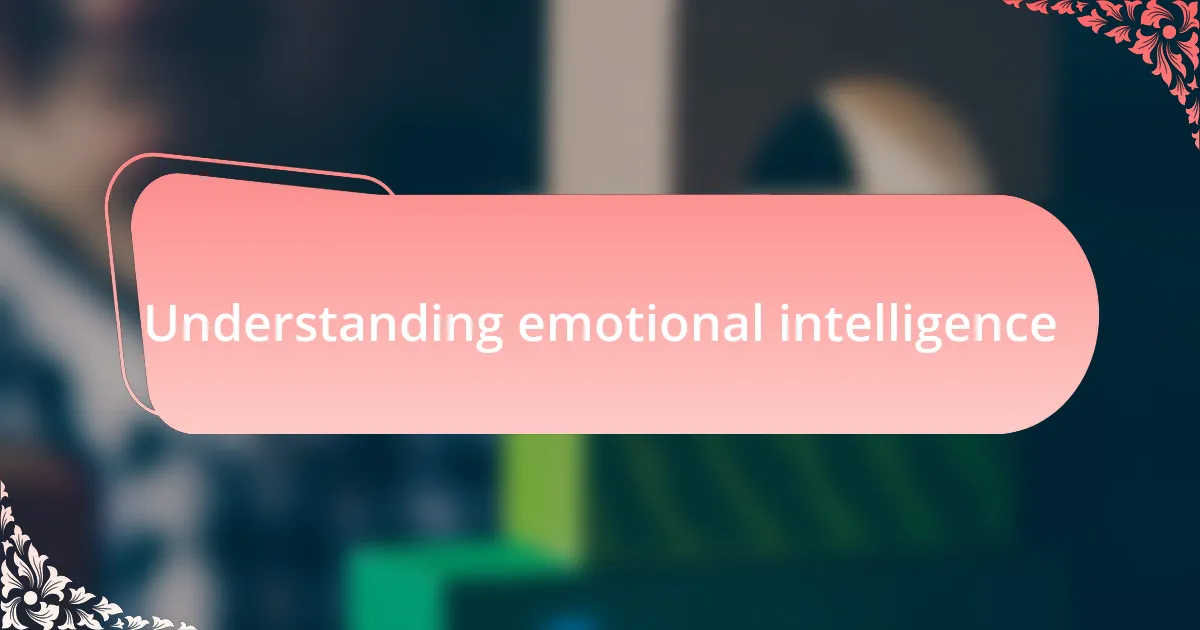
Understanding emotional intelligence
Emotional intelligence, often referred to as EQ, encompasses the ability to recognize, understand, and manage our own emotions, as well as those of others. I still remember the first time I had to calm a child who was feeling overwhelmed. I realized that my response—not just to the situation, but to their feelings—had a profound impact. How often do we stop to think about our emotional reactions?
Understanding emotional intelligence means developing self-awareness and empathy, which are crucial in supporting children’s mental health. When I interact with children, I try to reflect on their emotions, even when they can’t articulate them. For example, I’ve noticed that a simple acknowledgment of their feelings can transform a challenging moment into an opportunity for connection. Isn’t it fascinating how a little understanding can build trust?
Moreover, mastering emotional intelligence can lead to improved communication and relationships, especially within families. I’ve seen firsthand how children who feel understood are more likely to express themselves openly. This creates a nurturing environment where emotional growth can thrive. Doesn’t it make you think about how we engage with the emotions of those around us?
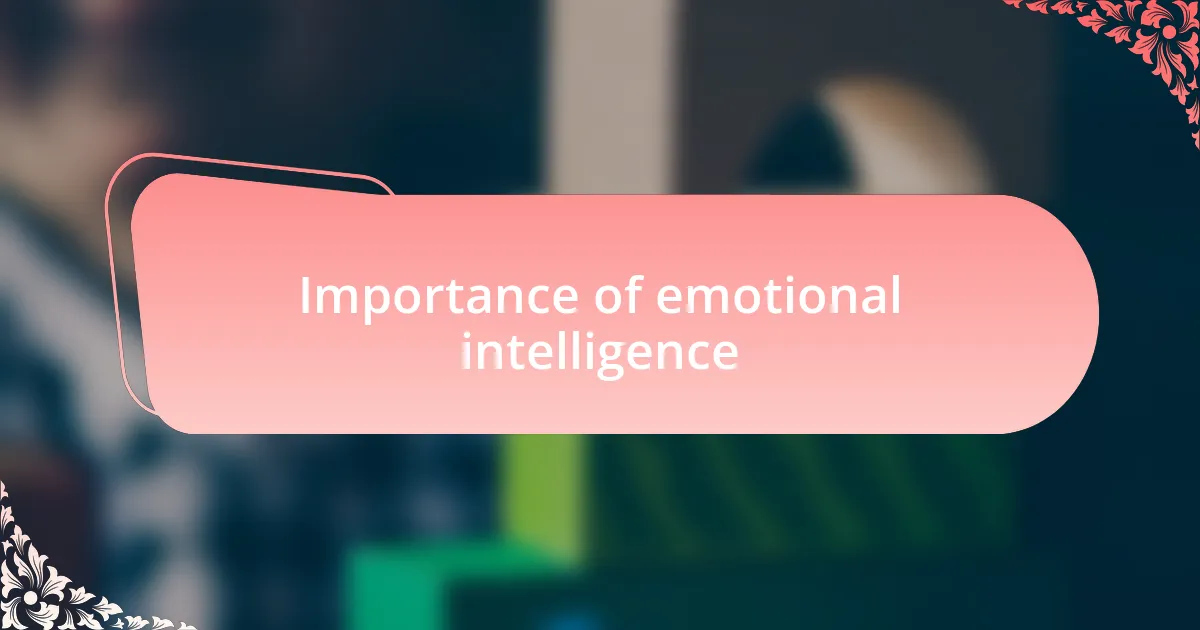
Importance of emotional intelligence
Emotional intelligence plays a vital role in a child’s development, impacting how they interact with peers and adults alike. I recall a time in the playground when a child struggled to share a toy; instead of simply instructing them to play nicely, I paused and asked how they felt about the situation. That moment of empathy fostered a deeper understanding between us and led to a more harmonious play experience. Have you ever noticed how a little emotional insight can change the dynamics among children?
Additionally, children with high emotional intelligence tend to cope better with stress. For instance, I remember helping a young girl who was anxious about an upcoming presentation. By encouraging her to express her feelings and providing strategies to manage her nerves, I witnessed her transform into a confident speaker. Isn’t it amazing how equipping children with emotional skills can empower them to face challenges?
Furthermore, fostering emotional intelligence creates a strong foundation for future relationships. I often see the positive effects in my own interactions; when I prioritize understanding and validating children’s feelings, they learn to do the same with their friends. This reciprocal growth is essential, as it cultivates empathy—a crucial ingredient for healthy relationships. Reflecting on this, don’t you think nurturing these skills in children is one of our most important responsibilities?
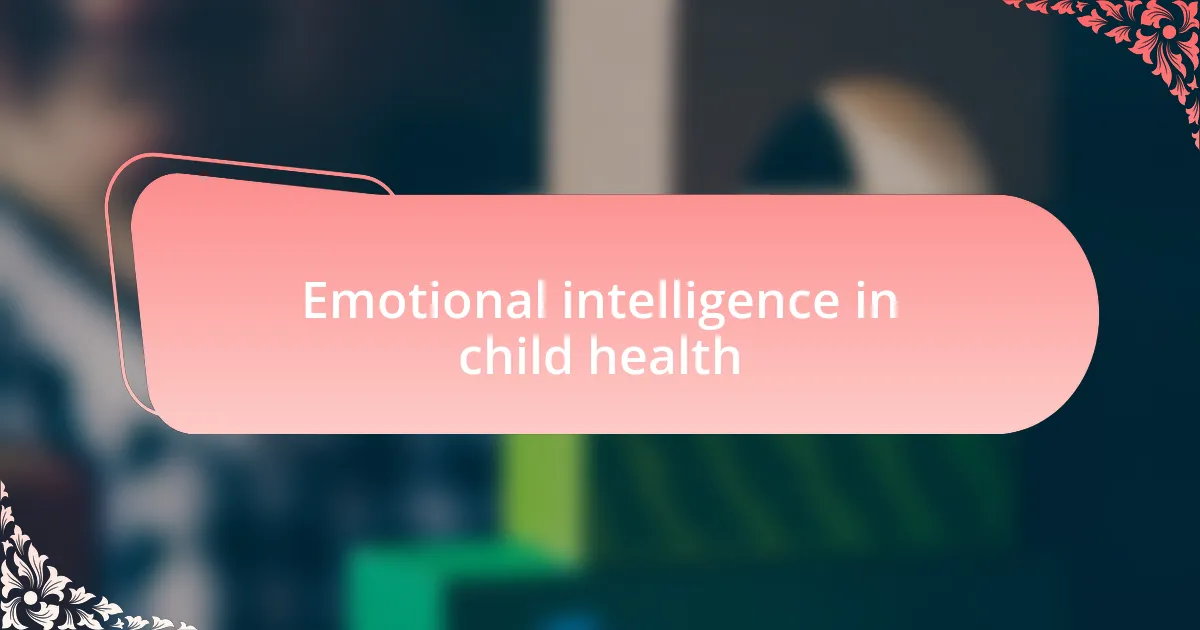
Emotional intelligence in child health
Emotional intelligence is crucial in managing health-related challenges in children. I remember a time when I worked with a child who was scared of visiting the doctor. Instead of dismissing his fears, I engaged him in a conversation about what made him anxious. By validating his feelings and sharing a few coping techniques, I saw his apprehension shift to curiosity. Have you ever realized how acknowledging a child’s emotions can turn a daunting experience into something manageable?
Moreover, children with developed emotional intelligence can better express their physical discomforts. I once guided a child who had trouble articulating his tummy ache. By encouraging him to name his feelings, he became more aware of his body and its signals. This awareness is essential; it empowers children to communicate better during medical visits. Do you think that teaching kids to connect their emotions to their physical states can lead to more effective healthcare interactions?
Additionally, fostering emotional intelligence can significantly impact a child’s resilience. I recall encouraging a young boy who faced setbacks in his sports practice. By helping him identify and manage his frustration, he learned to pursue improvement rather than give up. It was heartwarming to see his determination grow with every challenge he faced. Isn’t it incredible how teaching emotional skills can forge a path for children to navigate setbacks throughout their lives?
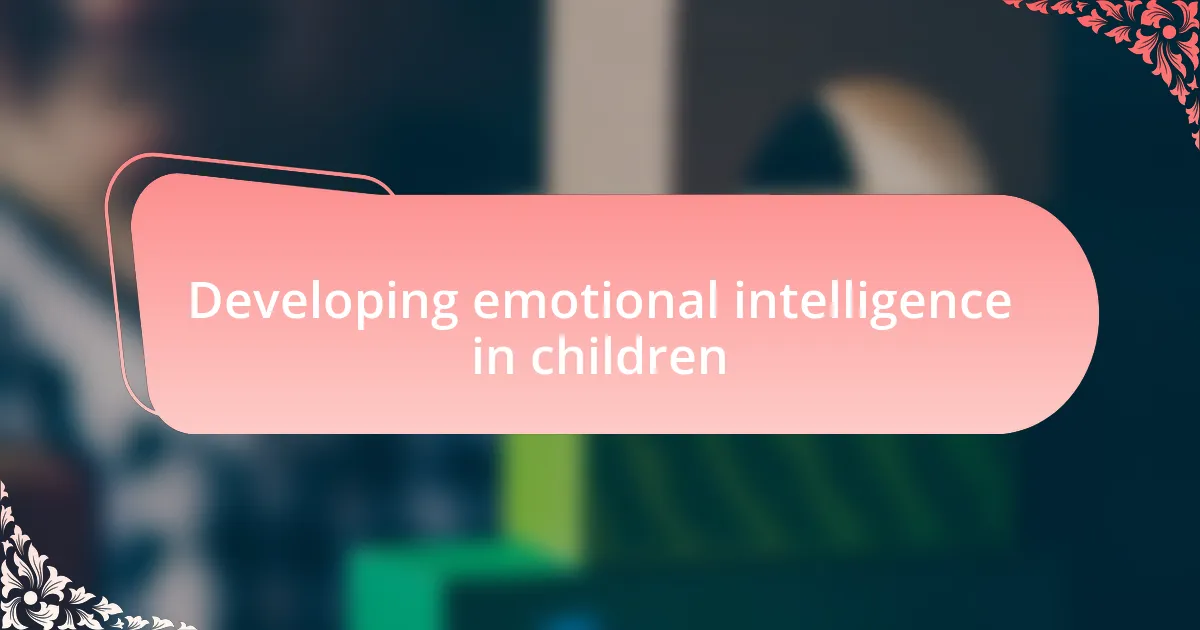
Developing emotional intelligence in children
One effective way to develop emotional intelligence in children is through role-playing scenarios. I remember organizing a small workshop where kids acted out various situations, like sharing toys or handling disappointment. Watching them experience these scenarios first-hand, I noticed their ability to empathize and understand different perspectives grow significantly. Isn’t it fascinating how play can be a profound teacher of emotional skills?
Engaging children in discussions about feelings is another valuable approach. I often found that asking open-ended questions, like “How did that make you feel?” sparks deeper conversations. I recall a child who initially struggled to identify his emotions, but gradually became more open as we explored various feelings together. It’s remarkable how simply creating a safe space for expression can cultivate awareness and lead to greater emotional understanding.
Lastly, modeling emotional intelligence as adults cannot be overstated. When I faced a tough day, I made it a point to share my feelings with the children around me. I would explain how I was feeling frustrated yet managed to find a solution, and they resonated with my honesty. Have you ever considered how powerful it is for children to see adults navigate their emotions? This transparency helps them recognize that everyone, regardless of age, experiences feelings – and that’s a crucial lesson in emotional growth.
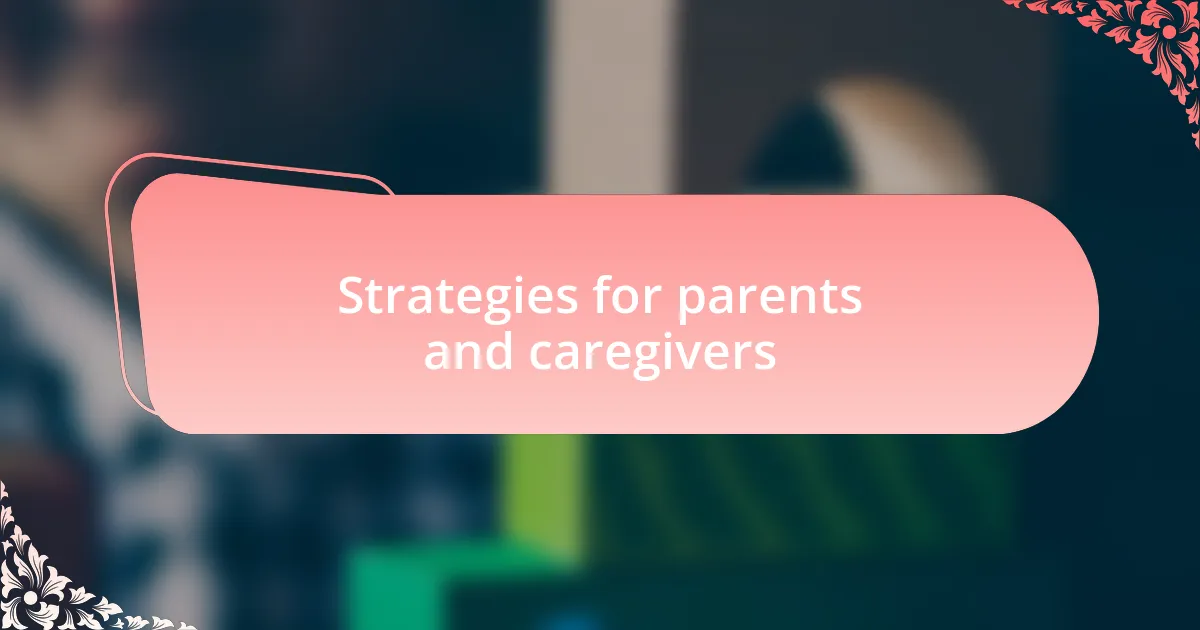
Strategies for parents and caregivers
When it comes to fostering emotional intelligence in children, one strategy that stands out is the practice of active listening. I recall sitting on the floor with my niece, fully engaged as she described her day. I made sure to reflect back what she was saying, which not only made her feel heard but also encouraged her to articulate her thoughts more clearly. Have you ever noticed how just giving someone your full attention can transform a conversation?
Another effective strategy is encouraging problem-solving through emotional discussions. I remember a time when my nephew faced a conflict with a friend. Instead of jumping in to resolve it for him, I asked guiding questions like, “What do you think would help?” This not only empowered him to think critically about his feelings and relationships but also cultivated his ability to navigate social situations independently. Isn’t it empowering when children realize they have the tools within them to handle such challenges?
Additionally, incorporating mindfulness activities can greatly enhance emotional awareness in kids. I’ve introduced simple breathing exercises during our family time, transforming tense moments into opportunities for calm. Just a few minutes of focused breathing helped everyone, including myself, reconnect and discuss what we were feeling. Can you remember a time when a moment of stillness made all the difference in a heated situation? Encouraging these practices can build resilience and emotional clarity over time.
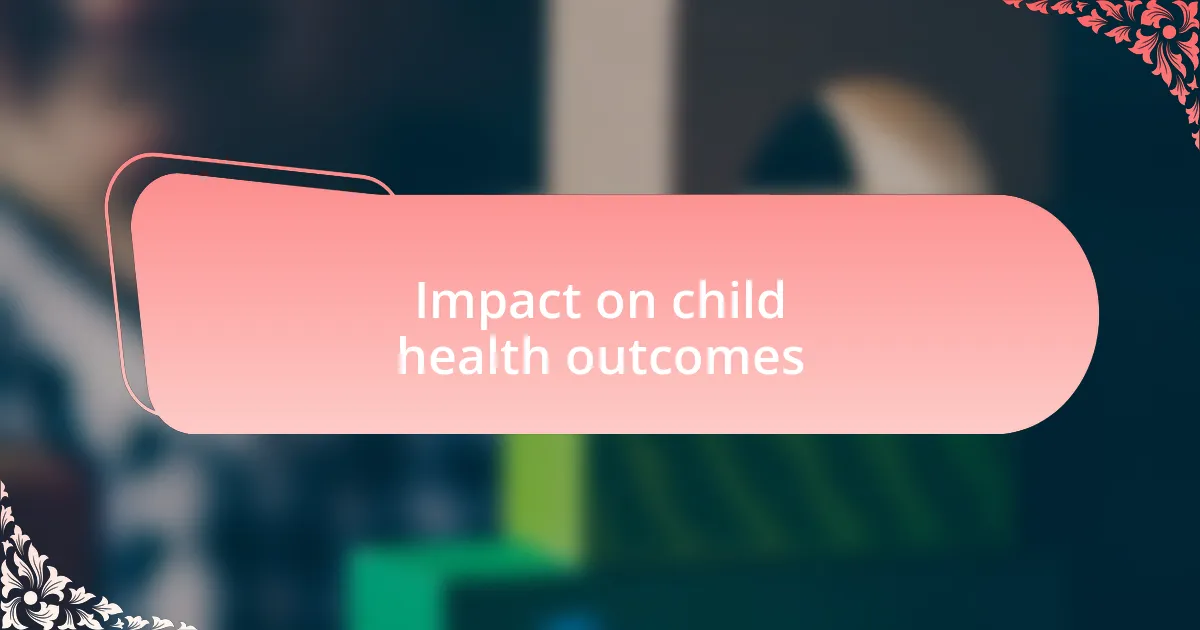
Impact on child health outcomes
Emotional intelligence significantly influences children’s health outcomes by enabling them to manage stress and anxiety effectively. I can recall a moment when my own child faced the pressure of school performance. By helping him articulate his worries—through simple yet impactful conversations—I saw him transition from anxiety to a sense of control over his feelings. Have you ever noticed how sharing feelings can lighten the emotional load?
Moreover, children with high emotional intelligence often display better relationships with peers, which directly impacts their mental well-being. I distinctly remember a situation where my daughter was invited to a birthday party. Instead of sticking to her comfort zone, she engaged in conversations with new friends, using her emotional skills to connect. It struck me then how vital social connections are to a child’s overall happiness and health.
Finally, fostering emotional intelligence can lead to healthier coping mechanisms during tough times. I’ve seen that when children feel understood and supported, they are more likely to express their feelings rather than bottle them up. This creates a ripple effect, as healthier emotional expressions can contribute to lower rates of childhood depression and anxiety. Isn’t it fascinating how much emotional understanding shapes a child’s overall health journey?